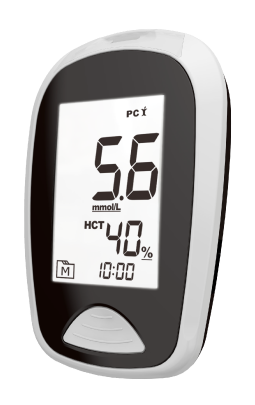
The relationship between severe acute respiratory syndrome coronavirus 2 (SARS-CoV-2) disease (COVID-19) and diabetes mellitus is bidirectional. On one hand, diabetes mellitus is associated with an increased risk of severe COVID-19. On the other hand, new onset diabetes and severe metabolic complications of pre-existing diabetes, including diabetic ketoacidosis (DKA) and hyperosmolarity have been observed in patients with COVID-19.*1
Q: Do people with diabetes have a higher chance of serious complications from COVID-19?
A: People with diabetes, hypertension, cardiovascular disease, and obesity, appear to be more vulnerable to becoming severely ill with the COVID-19 virus. When people with diabetes develop a viral infection, it can be harder to treat due to fluctuations in blood glucose levels and, possibly, the presence of diabetes complications.
There appear to be two reasons for this. Firstly, the immune system is compromised, making it harder to fight the virus and likely leading to a longer recovery period. Secondly, the virus may thrive in an environment of elevated blood glucose. *2
Q: Why people can develop diabetes after an acute COVID-19 infection?
A: The research teams from Stanford and Cornell University found that the coronavirus can impact the body’s insulin-producing cells, which can raise blood glucose levels — a hallmark of diabetes.
The pancreas makes insulin, which helps sugar get into the body’s cells to be used as energy. But with type 1 diabetes, the body doesn’t make any insulin and the glucose stays in the blood, causing health problems. With type 2 diabetes, the body makes some — but not enough — insulin.
One of the studies, published by the Journal of Diabetes, Obesity and Metabolism, found that 14.4% of hospitalized COVID-19 patients developed diabetes, though a distinction between type 1 and type 2 was not made. The study involved more than 3,700 people.
The lab studies had suggested that SARS-CoV-2 can infect human beta cells. They also showed that this dangerous virus can replicate in these insulin-producing beta cells, to make more copies of itself and spread to other cells. *345
Q: Why control blood ketone level is also important?
A: When sick with a viral infection, people with diabetes do face an increased risk of diabetic ketoacidosis (DKA), commonly experienced by people with type 1 diabetes.
DKA can make it challenging to manage your fluid intake and electrolyte levels—which is important in managing sepsis. Sepsis and septic shock are some of the more serious complications that some people with COVID-19 have experienced. *6
During the COVID-19 pandemic, tight control of glucose levels and prevention of diabetes complications might be crucial in patients with diabetes mellitus to keep susceptibility low and to prevent severe courses of COVID-19. Your risk of getting very sick from COVID-19 is likely to be lower if your diabetes is well-managed.
As COVID-19 lacks definitive treatment so far, patients with diabetes mellitus should follow general preventive rules strictly and monitor glucose levels more frequently, engage in physical activity, eat healthily and control other risk factors.
Uncontrolled hyperglycemia (high blood sugar) damages blood vessels and nerves throughout the body, which can damage the eyes, kidneys and heart, along with the loss of sensation in feet that’s associated with amputations. Hyperglycemia is also associated with fat accumulation in the liver and in muscle, leading to fatty liver disease and heart failure.
These effects of hyperglycemia are often present at diagnosis of diabetes. However, we know that it takes at least five years of hyperglycemia to begin to develop these complications, so anyone whose blood sugar levels aren’t normal after their COVID-19 illness probably has already begun to develop these complications. Intensive glucose control initiated early in the disease process can significantly increase the time to onset or progression of these complications.
We need to be careful to use the COVID-19-related hyperglycemia as a warning sign that Type 2 diabetes is going to happen in a person’s lifetime, but that they have a chance to take action to slow or delay the progression to hyperglycemia that meets criteria for the diagnosis.
Patients can use this warning sign to delay the diagnosis of diabetes for many years if they make appropriate adjustments to overall lifestyle. *78
Why URiGHT?
URiGHT VTRUST ProCheck can test not only the blood sugar level, but also the blood ketone and total cholesterol, which can help one better monitor and manage health conditions in the time of COVID-19 in order to lower the risk of developing serious health problems.
For more information about URiGHT VTRUST ProCheck multi-functional monitoring system, please click here.
If you are interested in becoming our distributor, please don’t hesitate to contact us!
*1: N Engl J Med. (2020 Aug 20). New-Onset Diabetes in Covid-19. The New England Journal of Medicine; 383(8):789-790. doi: 10.1056/NEJMc2018688. Epub 2020 Jun 12. Retrieved from https://www.nejm.org/doi/full/10.1056/nejmc2018688
*2: COVID-19 and diabetes (Last update: 2021 May 20). IDF (international diabetes federation). Retrieved from https://www.idf.org/aboutdiabetes/what-is-diabetes/covid-19-and-diabetes/1-covid-19-and-diabetes.html
*3: Dr. Francis Collins (2021 Jun 8). How COVID-19 Can Lead to Diabetes. NIH Director’s Blog. Retrieved from https://directorsblog.nih.gov/2021/06/08/how-covid-19-can-lead-to-diabetes/
*4: Thirunavukkarasu Sathish PhD, Nitin Kapoor MD, Yingting Cao PhD, Robyn J. Tapp PhD, Paul Zimmet PhD (2020 Nov 20). Proportion of newly diagnosed diabetes in COVID-19 patients: A systematic review and meta-analysis. Diabetes, Obesity and Metabolism. Retrieved from https://doi.org/10.1111/dom.14269
*5: BILL SULLIVAN (2021 Jun 11). Can COVID-19 lead to diabetes? Here’s what you need to know. National Geographic. Retrieved from https://www.nationalgeographic.com/science/article/can-covid-19-lead-to-diabetes-heres-what-you-need-to-know
*6: How COVID-19 Impacts People with Diabetes. ADA (American Diabetes Association. Retrieved from https://www.diabetes.org/coronavirus-covid-19/how-coronavirus-impacts-people-with-diabetes
*7: Soo Lim, Jae Hyun Bae, Hyuk-Sang Kwon & Michael A. Nauck (2020 Nov 13). COVID-19 and diabetes mellitus: from pathophysiology to clinical management. Nature Reviews Endocrinology. Retrieved from https://www.nature.com/articles/s41574-020-00435-4?elqTrackId=4d78d0c02164463d98a39ad58b60bfdc
*8: Kathleen Wyne, MD, PhD (2021 Feb 9) Why are people developing diabetes after having COVID-19? The Ohio State University Wexner Medical Center. Retrieved from https://wexnermedical.osu.edu/blog/why-are-people-developing-diabetes-after-having-covid19


